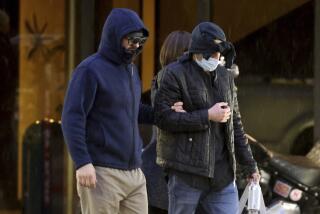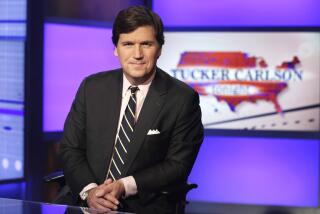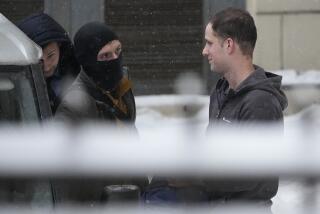Another Trump campaign aide acknowledges meeting senior Russian officials in mid-2016
Former Trump campaign foreign policy advisor Carter Page told congressional investigators that he spoke privately with Russia’s deputy prime minister and several legislators during a campaign-approved trip to Moscow in July 2016, the latest member of the Trump team to belatedly acknowledge contacts with Russian officials last year.
During seven hours of closed-door testimony to the House Intelligence Committee on Nov. 2, Page contradicted his previous public denials of any meetings with Russian government officials. He also urged the campaign to send Trump to Moscow instead of him to “raise the temperature a little bit,” according to an email obtained by the committee.
For the record:
11:05 a.m. Nov. 7, 2017A earlier version of this article did not fully identify Trump campaign official J.D. Gordon. His role and full name have been added.
Page became at least the ninth member of President Trump’s campaign team or White House staff to confirm direct contact with senior officials in Russian President Vladimir Putin’s government during the 2016 campaign or during the transition, a pattern that has created a growing headaches for the White House.
Special counsel Robert S. Mueller III and several congressional committees are investigating whether those meetings and communications illegally aided Moscow’s ambitious attempts to interfere with the U.S. election campaign through hacking of Democratic Party emails, social media posts and ads, and other efforts.
Page, a Manhattan-based energy consultant, was unknown to foreign policy veterans and diplomats in Washington when Trump, then a presidential candidate, named him to a small team of foreign policy advisors in March 2016.
After his visit to Moscow that July, Page reported to campaign officials in an email that he had received “incredible insights and outreach” from his discussions with Deputy Prime Minister Arkady Dvorkovich, from members of the Russian legislature, known as the Duma, and from “senior members” of Putin’s government.
“In a private conversation Dvorkovich expressed strong support for Mr. Trump and a desire to work together toward devising better solutions in response to the vast range of current international problems,” Page wrote in another email obtained by the committee.
In his testimony, Page denied that his conversations were substantive, insisting that he met only briefly with Dvorkovich before they each spoke to graduates at an academic institution in Moscow called the New Economic School.
An executive from Russia’s largest oil company, Andrey Baranov, attended the speech and may have expressed Moscow’s desire to see U.S. sanctions on Russia lifted, Page said. The sanctions were imposed by the Obama administration in 2014 after Russian forces intervened in neighboring Ukraine and seized the Crimean peninsula.
He denied discussing the matter in depth with Baranov, who works with Rosneft, which is majority-owned by the Russian government. “He may have mentioned it to me. I had no discussions,” Page told the committee, according to a transcript of his testimony released late Monday.
Page said that he had solicited advice from other campaign aides about what to say in his Moscow speech and said that his trip wasn’t a secret. He also proposed that Trump should go to Moscow instead of him.
“If [Trump would] like to take my place and raise the temperature a little bit, of course I’d be more than happy to yield this honor to him,” he wrote to senior campaign official J.D. Gordon and another campaign aide in a May 16, 2016, email turned over to the House committee.
Gordon said in a statement that he discouraged Page from making the speech in Moscow. “He eventually went around me directly to campaign leadership,” Gordon said.
At a dinner on Capitol Hill, Page told then-Sen. Jeff Sessions, the campaign’s top foreign policy advisor and now U.S. attorney general, and Sam Clovis, another senior campaign official, about his plans to travel to Moscow a month before he left. Page said he also spoke to Clovis about the trip after he returned.
Clovis withdrew his name from a senior position at the Agriculture Department last week after court papers indicated he had encouraged a junior aide, George Papadopoulos, to visit Moscow if possible.
Papadopoulos, who also was present at the dinner, has pleaded guilty to lying to FBI agents about his contacts with Russians last year. According to court papers, he discussed his meetings with Russian officials — including a woman who he believed was Putin’s niece — during a sit-down session with Trump, Sessions and other top campaign officials on March 31, 2016.
That is the first evidence to emerge indicating Trump was personally told about meetings between a campaign advisor and Russian officials. Trump has repeatedly denied any knowledge of such contacts and denounced the investigations as a partisan “witch hunt.”
Sessions is scheduled to testify Nov. 14 to the House Judiciary Committee, where Democrats are expected to press him about what he knew about the meetings.
During his confirmation hearings in January, Sessions said he knew of no one from the campaign who was in touch with Russian officials. He repeated that denial in another Senate hearing last month.
In recent months, Page had repeatedly denied to reporters that he met with Russian government officials in Moscow, insisting he met only with academics and business executives he had known for years.
A former Navy officer, Page lived in Moscow from 2004 to 2007 while working as a junior investment banker for Merrill Lynch. He later started his own investment firm, Global Energy Capital, and he was largely sympathetic to Russia’s complaints about U.S. sanctions, human rights demands and other policies.
Page’s meetings in Moscow, at the height of the presidential campaign, was one of the factors that prompted the FBI to launch a counterintelligence investigation in July 2016, the New York Times has reported.
Page left the campaign soon after he returned to Washington, and Trump and his advisors later tried to distance themselves from him.
After questions first emerged about Page’s contacts with Russia, Trump called him a “very low-level member” of his foreign policy team and said, “I don’t think I’ve ever spoken to him.” Page has said he attended meetings with Trump but never conversed with him.
Twitter: @davidcloudLAT
UPDATES:
3 p.m.: This article was updated throughout with additional details, including other Trump campaign advisors who had contact with Russians.
This article was originally published at 3 a.m.
More to Read
Start your day right
Sign up for Essential California for news, features and recommendations from the L.A. Times and beyond in your inbox six days a week.
You may occasionally receive promotional content from the Los Angeles Times.







